Cats and Mandarins: A Dangerous Mix? Vet Explains Why Citrus is Toxic
- 11 Apr 2025 16:18
The sweet scent and bright orange hue of a mandarin orange (a type of tangerine) might seem appealing, and as curious creatures, cats might show interest in this easy-to-peel fruit. We know sharing human food with pets requires caution, leading many cat owners to ask: can cats eat mandarins? While mandarins are a healthy snack for humans, packed with Vitamin C, the answer for our feline friends is a definitive and crucial **no**.
Cats possess a unique physiology, vastly different from ours, especially regarding how they process certain plant compounds. As obligate carnivores, their bodies are not designed to handle many substances found naturally in fruits, particularly citrus fruits like mandarins. Ingesting mandarins can lead to unpleasant and potentially serious health consequences for cats. This article provides an authoritative, vet-informed explanation of why mandarins are toxic to cats, detailing the harmful components, potential symptoms of poisoning, and essential steps for prevention, ensuring you have the trustworthy information needed to protect your pet.
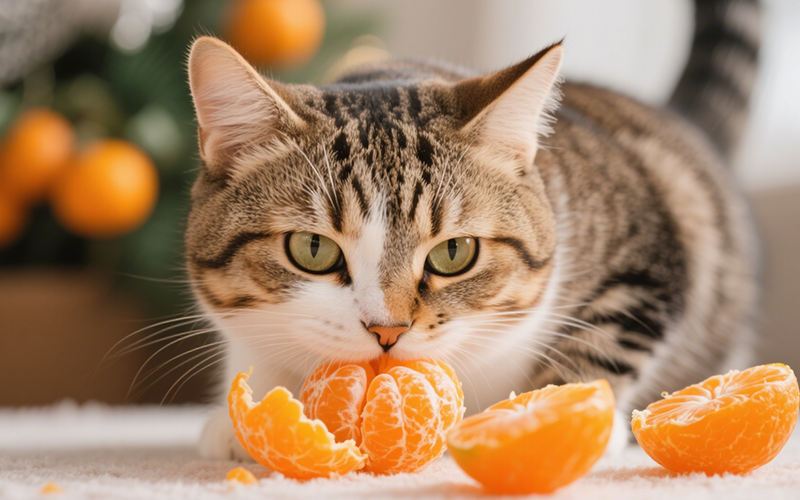
What Are Mandarins? Understanding the Fruit
Mandarins, including varieties like tangerines, clementines, and satsumas, are small, sweet citrus fruits belonging to the *Rutaceae* family, just like oranges, lemons, limes, and grapefruits. Key parts of the mandarin include:
Peel (Rind/Zest): The brightly colored outer skin, known for being easy to remove and rich in aromatic essential oils.
Pith: The white, spongy layer underneath the peel.
Flesh (Segments/Pulp) and Juice: The sweet, juicy inner parts of the fruit.
Seeds: Small seeds may be present in some varieties.
Leaves: Like other citrus trees, the leaves also contain essential oils.
Several components, especially the potent essential oils concentrated in the peel and leaves, along with the fruit's acidity, are problematic for cats.
Why Cats and Citrus Don't Mix: Feline Biology Explained
The fundamental reasons why mandarins and other citrus fruits are unsuitable and dangerous for cats lie in their unique biology:
Obligate Carnivores: Cats evolved as hunters, deriving nearly all their required nutrients from animal prey. Their digestive systems are short and highly efficient at processing meat (protein and fat) but poorly equipped to handle large amounts of plant material, sugars, or high acidity.
Sensitivity to Scents: Cats possess an acute sense of smell. The strong, pungent aroma of citrus fruits, primarily due to volatile essential oils like limonene, is often naturally repellent to them. This aversion acts as a protective instinct.
Metabolic Limitations: Cats lack specific liver enzymes necessary for efficiently metabolizing and detoxifying certain compounds prevalent in plants, notably the essential oils found in citrus peels and leaves. This inability to process these substances can lead to toxic buildup.
Taste Aversion: While sweet, the underlying acidity of mandarins is generally unpalatable to cats, who typically lack the "sweet" taste receptors found in humans and dogs.
These biological factors make cats particularly vulnerable to the toxic effects of compounds present in mandarins.
The Clear Answer: Are Mandarins Toxic to Cats?
Yes, mandarins are considered **toxic to cats**. According to veterinary toxicologists and organizations like the ASPCA (American Society for the Prevention of Cruelty to Animals), all parts of the mandarin fruit and plant contain substances harmful to felines. The primary toxic agents include:
Essential Oils: Limonene and linalool are the main culprits, highly concentrated in the peel but also present in the flesh, juice, and leaves.
Psoralens: These compounds are found in the plant and fruit and can cause photosensitivity.
Citric Acid: While less severely toxic, the acidity can cause significant irritation.
Ingestion of any part of the mandarin – peel, flesh, juice, seeds, or leaves – poses a risk. Furthermore, exposure to concentrated mandarin essential oil (through spills, ingestion, or even diffusion) is particularly dangerous.
Toxic Components in Mandarins and Their Effects on Cats
Let's examine why these components are harmful:
Limonene and Linalool (Essential Oils)
These are the main aromatic compounds in mandarins and other citrus fruits. For cats:
High Concentration: The peel contains the highest levels, making it the most dangerous part if ingested or chewed on.
Irritation: Contact can irritate the skin, mouth, and throat. Ingestion causes gastrointestinal irritation.
Digestive Upset: Common effects include drooling (due to bad taste and irritation), vomiting, and diarrhea.
Neurological Symptoms: If a significant amount is ingested, or if concentrated essential oils are involved, these compounds can depress the central nervous system. Symptoms may include lethargy, weakness, muscle tremors, stumbling (ataxia), and in severe cases, hypothermia or collapse.
Liver Strain/Damage: The feline liver struggles to process these oils, potentially leading to liver damage with significant exposure.
Respiratory Issues: Inhaling diffused mandarin essential oil can be harmful to cats, potentially causing respiratory distress.
Psoralens
These compounds are naturally present in citrus plants.
Phototoxicity: The primary concern with psoralens is photosensitivity. If a cat ingests them or gets them on their skin/fur and is then exposed to sunlight (UV radiation), it can trigger a severe dermatological reaction.
Photodermatitis: This reaction looks like an exaggerated sunburn, causing redness, inflammation, blistering, and pain.
Citric Acid
The natural acidity of mandarin juice and flesh contributes to the problem:
Oral Irritation: Can cause discomfort, excessive salivation, or potentially mouth sores.
Gastrointestinal Irritation: Can contribute to stomach upset, vomiting, and discomfort.
Given these multiple toxic components, it's clear why the answer to "can cats eat mandarin oranges?" is a firm no.
Signs and Symptoms of Mandarin Poisoning in Cats
If you suspect your cat has ingested mandarin or been exposed to its essential oil, be vigilant for the following signs. The severity depends on the amount consumed and the part of the fruit involved (peel being the worst).
Mild to Moderate Symptoms:
Excessive Drooling / Foaming at the Mouth
Vomiting
Diarrhea
Lethargy / Depression
Appetite Loss
Skin redness or irritation (if contact with peel/oil)
Severe Symptoms (More likely with large ingestion or essential oil exposure):
Weakness
Difficulty walking, stumbling (Ataxia)
Muscle Tremors
Low Body Temperature (Hypothermia)
Low Blood Pressure (Hypotension)
Severe Skin Reactions / Photosensitivity (after sun exposure)
Collapse
Potential for Liver Damage (may show later signs like jaundice)
Any symptoms of potential poisoning warrant immediate veterinary attention. Do not wait to see if symptoms worsen.
All Parts Are Dangerous: Peel, Flesh, Juice, Seeds, Leaves
It cannot be stressed enough: every part of the mandarin plant and fruit is potentially harmful:
Mandarin Peel (Rind): The most dangerous part due to highly concentrated essential oils and psoralens. Even minor licking or chewing can cause irritation and toxicity.
Mandarin Flesh and Juice: Contain citric acid causing irritation, plus lower but still significant levels of essential oils and psoralens. Mandarin juice is bad for cats.
Mandarin Seeds: Contain small amounts of toxic compounds; less of a primary concern than other parts but still unsafe.
Mandarin Leaves: Also contain harmful essential oils and psoralens if chewed.
Mandarin Essential Oil: Extremely concentrated and highly toxic via all routes – ingestion, skin contact, and inhalation.
The rule is simple: complete avoidance is necessary for cats and mandarins.
Emergency Action: What to Do If Your Cat Eats Mandarin
If you see your cat eating mandarin or suspect exposure, act fast:
1. Remove the Cat & Source: Immediately take your cat away from the mandarin (fruit, peel, plant, spilled juice, essential oil). Securely remove or dispose of the source material. 2. Clean Up: Wipe up any spilled juice or residue thoroughly. Check your cat's fur and mouth for any remaining pieces or oils. Gently wipe fur with a damp cloth (water only) if necessary to prevent further ingestion via grooming. Be careful checking the mouth as it might be sore. 3. DO NOT Induce Vomiting: Never try to make your cat vomit at home unless explicitly instructed by a veterinarian. It can be dangerous, especially with irritating substances. 4. Call Your Veterinarian or Pet Poison Helpline IMMEDIATELY: This is the most vital step. Contact your local vet, an emergency animal hospital, or a dedicated pet poison hotline (e.g., ASPCA Animal Poison Control Center, Pet Poison Helpline – note that fees may apply for hotline services, but they offer expert toxicologist advice). 5. Provide Details: Be prepared to tell the veterinary professionals what part of the mandarin was involved, how much you think was ingested/contacted, when it happened, and any symptoms your cat is exhibiting.
Timely veterinary intervention is key to managing mandarin toxicity in cats and achieving the best possible outcome.
Prevention: Keeping Mandarins Away From Cats
The best strategy is strict prevention:
Secure Storage: Keep mandarins and other citrus fruits stored securely in the refrigerator or in cat-proof containers/cabinets, well out of reach.
Countertop Caution: Don't leave mandarins, peels, or segments unattended on counters or tables where cats can access them. Be especially careful with discarded peels.
Clean Spills Immediately: Wipe up any dropped fruit or spilled juice promptly and thoroughly.
Avoid Citrus Essential Oils: Do not use mandarin, orange, lemon, lime, or grapefruit essential oils in diffusers, sprays, cleaners, or topical applications in a home with cats. The risk from inhalation or accidental ingestion/contact is too high. Choose pet-safe cleaning products and air fresheners.
Check Product Ingredients: Be aware of citrus extracts or oils in some household products.
Educate Everyone: Ensure family members and guests know that mandarins are poisonous to cats and should never be offered as a treat or left accessible.
Garden Awareness: If you grow citrus trees, prevent your cat from accessing them to chew leaves or fruit.
Safe and Healthy Alternatives for Feline Treats
There are many safe and species-appropriate ways to treat your cat:
High-Quality Commercial Cat Treats: Specifically formulated for feline nutritional needs.
Plain Cooked Meat: Small amounts of unseasoned, cooked chicken, turkey, lean beef, or fish (boneless).
Freeze-Dried Meat Treats: Single-ingredient options like chicken, salmon, or minnows.
Catnip or Silver Vine: Occasional herbal treats enjoyed by many cats.
Specially Grown Cat Grass: Safe greens like oat or wheat grass aid digestion.
Engaging Toys: Interactive play with wand toys or providing puzzle feeders satisfies hunting instincts safely.
Veterinary Consensus: Citrus Fruits are a No-Go for Cats
The veterinary community and pet poison experts universally agree that citrus fruits, including mandarins, are toxic to cats and should be strictly avoided. The risks associated with essential oils, psoralens, and citric acid are well-established. Experts consistently recommend preventing access to these fruits and avoiding the use of citrus essential oils in feline environments due to the potential for gastrointestinal upset, skin reactions, neurological problems, and respiratory issues. The advice is unequivocal: keep cats and citrus completely separate.
Mandarin Toxicity in Cats: Quick Reference Table
| Aspect | Key Information for Cat Owners |
| Can Cats Eat Mandarins? | No. Mandarins (and other citrus) are toxic to cats. |
| Toxic Parts | ALL: Peel, flesh, juice, seeds, leaves. Peel & essential oils are most dangerous. |
| Toxic Compounds | Essential Oils (Limonene, Linalool), Psoralens, Citric Acid. |
| Symptoms of Poisoning | Drooling, vomiting, diarrhea, lethargy, tremors, weakness, ataxia, skin irritation/photosensitivity. Includes symptoms mandarin poisoning cats. |
| Essential Oil Danger | Extremely toxic via ingestion, skin contact, or inhalation. Avoid mandarin essential oil cats exposure. |
| Action if Exposed | Remove cat & source, clean residue, DO NOT induce vomiting, Call Vet/Poison Control IMMEDIATELY. |
| Prevention | Secure storage, countertop vigilance, avoid citrus essential oils, educate household. Keep cats and mandarins apart. |
Need Fast Pet Health Guidance? PettureX Can Assist!
Pet health emergencies, like potential poisoning from mandarins, can be stressful. Knowing where to turn for quick information while contacting your veterinarian is essential. Sometimes you just need fast answers or guidance on the urgency of a situation.
The PettureX App is designed to provide support for pet parents in such moments and for everyday care:
24/7 AI Vet Consultation: Have an urgent question like "Is mandarin peel fatal to cats?" or "What are the first signs of mandarin poisoning in cats?" Get immediate AI-powered veterinary insights and advice on whether to seek emergency care, available anytime.
Symptom Checker: Input your cat's symptoms (e.g., drooling, lethargy after potential exposure) for an AI analysis of potential causes and severity.
Image Recognition: While it can't diagnose poisoning, it could potentially help identify skin reactions (like photodermatitis) if your cat had contact with the peel and subsequent sun exposure.
Quick Information Access: Find fast answers to common pet health questions and access a database of pet care knowledge.
PettureX acts as a valuable digital assistant, offering rapid access to AI-driven support and information, helping you make informed decisions alongside your trusted veterinarian.
Conclusion: Mandarins are Off-Limits for Feline Friends
In summary, the question "can cats eat mandarins?" has a clear and critical answer: No. Mandarins, like all citrus fruits, contain essential oils, psoralens, and citric acid, which are toxic to cats. Ingestion or significant exposure can lead to a range of symptoms from digestive upset to serious neurological issues and skin reactions.
Ensuring your cat's safety requires diligent prevention. Keep mandarins and related products completely out of reach, and never use citrus essential oils in your home. Opt for safe, species-appropriate treats and enrichment activities instead.
If you ever suspect your cat has ingested mandarin or any other potentially toxic substance, immediate consultation with your veterinarian or a pet poison control center is paramount. By understanding the risks and taking preventative measures, you can keep your curious cat safe from the dangers posed by this seemingly harmless fruit.
Related
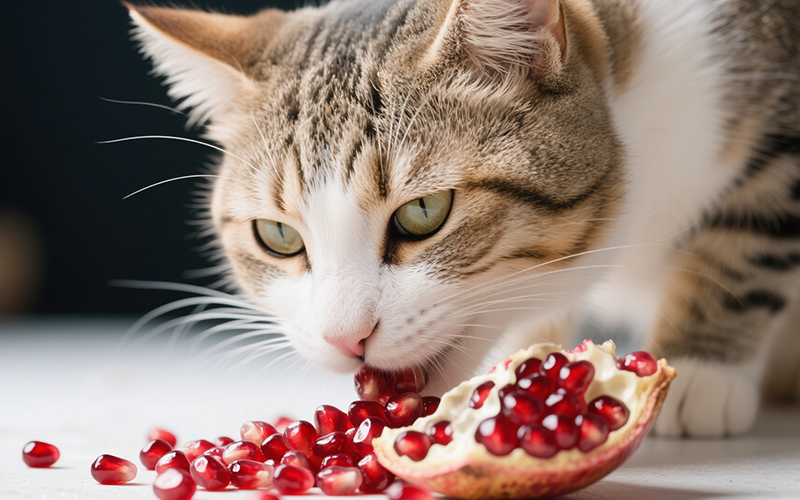
Pomegranate Peril: Can Cats Eat the Seeds Safely? A Vet-Reviewed Guide
- 25 Apr 2025
Prickly Problem: Can Cats Eat Pineapple Leaves Safely? A Vet-Reviewed Risk Analysis
- 25 Apr 2025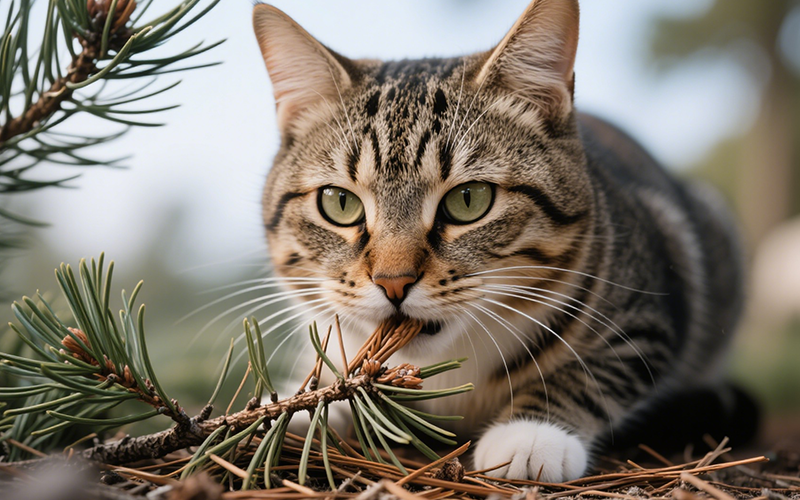
The Prickly Truth: Can Cats Eat Pine Needles Safely? A Guide for Concerned Owners
- 24 Apr 2025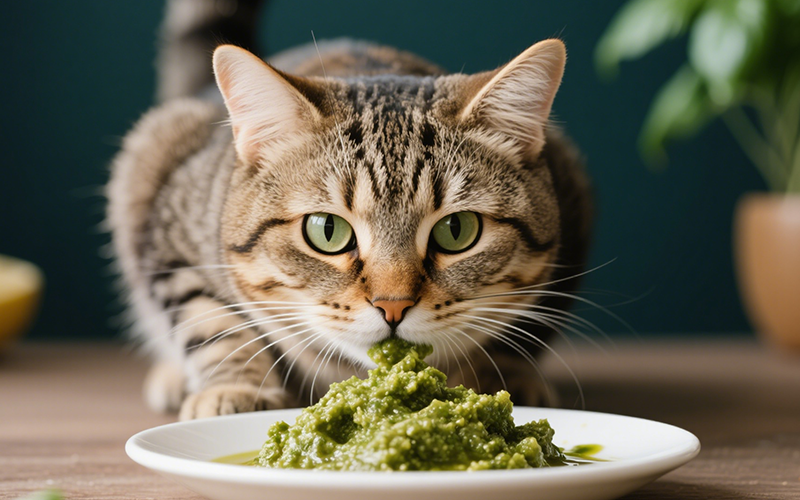
Pesto & Paws: A Dangerous Mix? Can Cats Eat Pesto Safely?
- 24 Apr 2025
Persimmons and Paws: Can Cats Safely Eat This Autumn Fruit? A Vet-Reviewed Guide
- 23 Apr 2025
Nutritional Yeast for Cats: Savory Sprinkle or Health Hazard? A Vet-Reviewed Guide
- 23 Apr 2025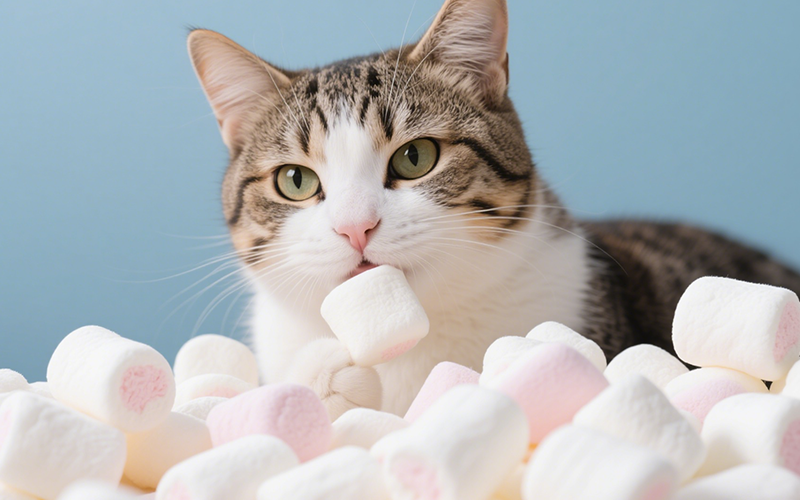
Marshmallows and Cats: A Puffy Problem? Why Vets Say No to This Sugary Snack
- 22 Apr 2025
Kefir for Kitties? A Veterinarian-Reviewed Guide to Safety, Benefits & Risks
- 22 Apr 2025
The Burning Question: Can Cats Eat Jalapenos? A Comprehensive Safety Guide
- 21 Apr 2025
Cool Temptation: Can Cats Eat Ice Cream Safely? The Vet-Backed Truth
- 21 Apr 2025
